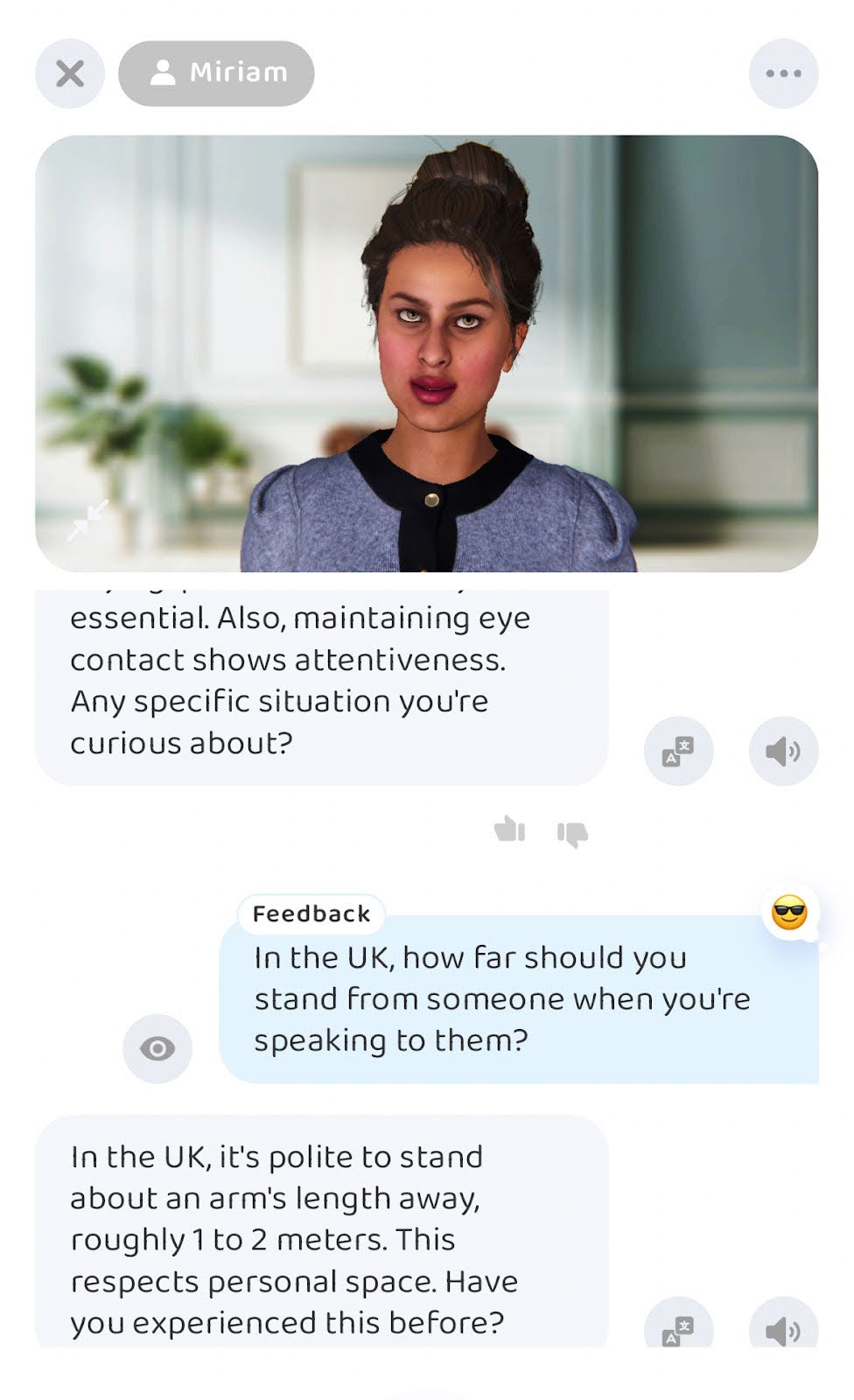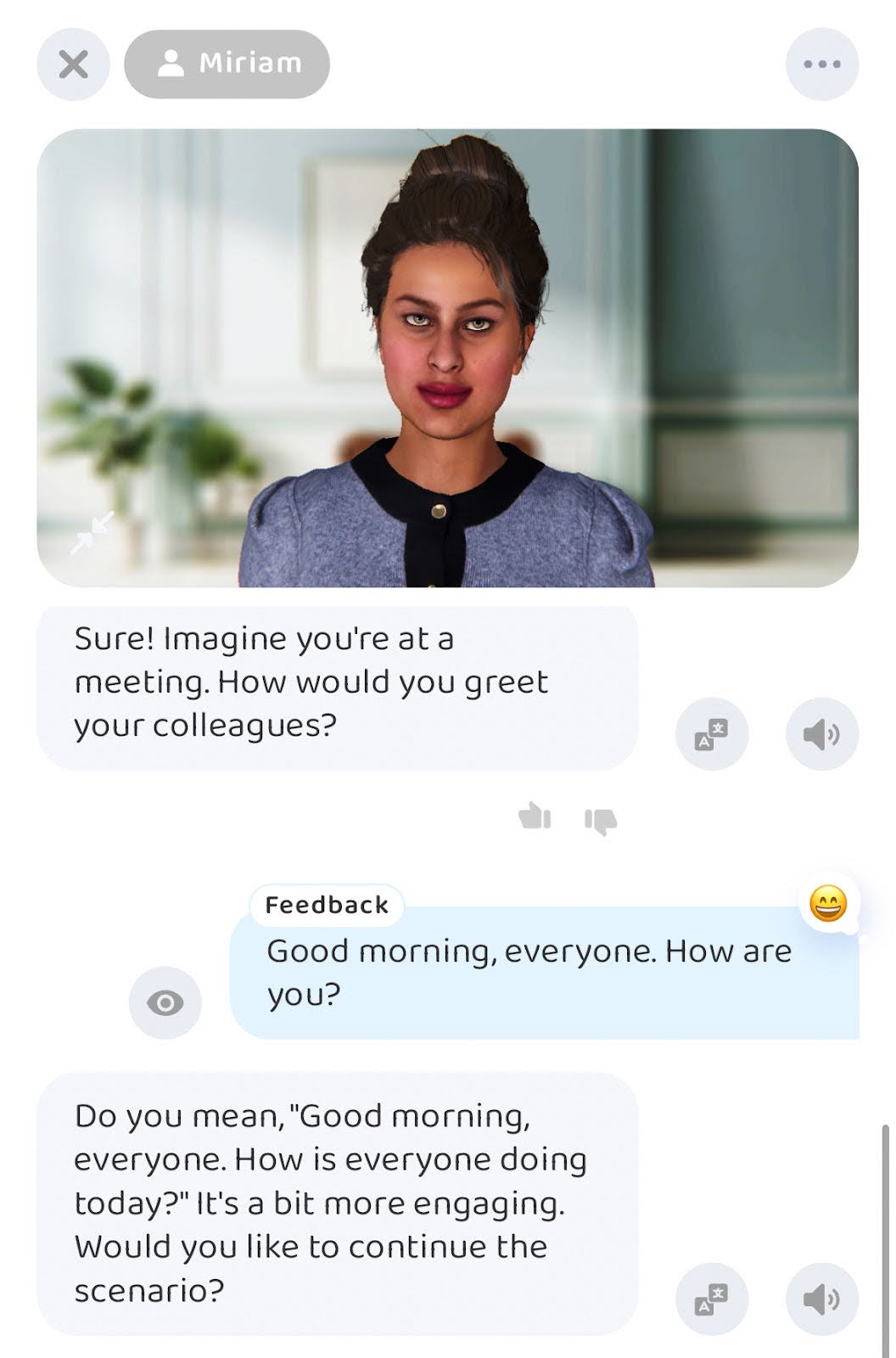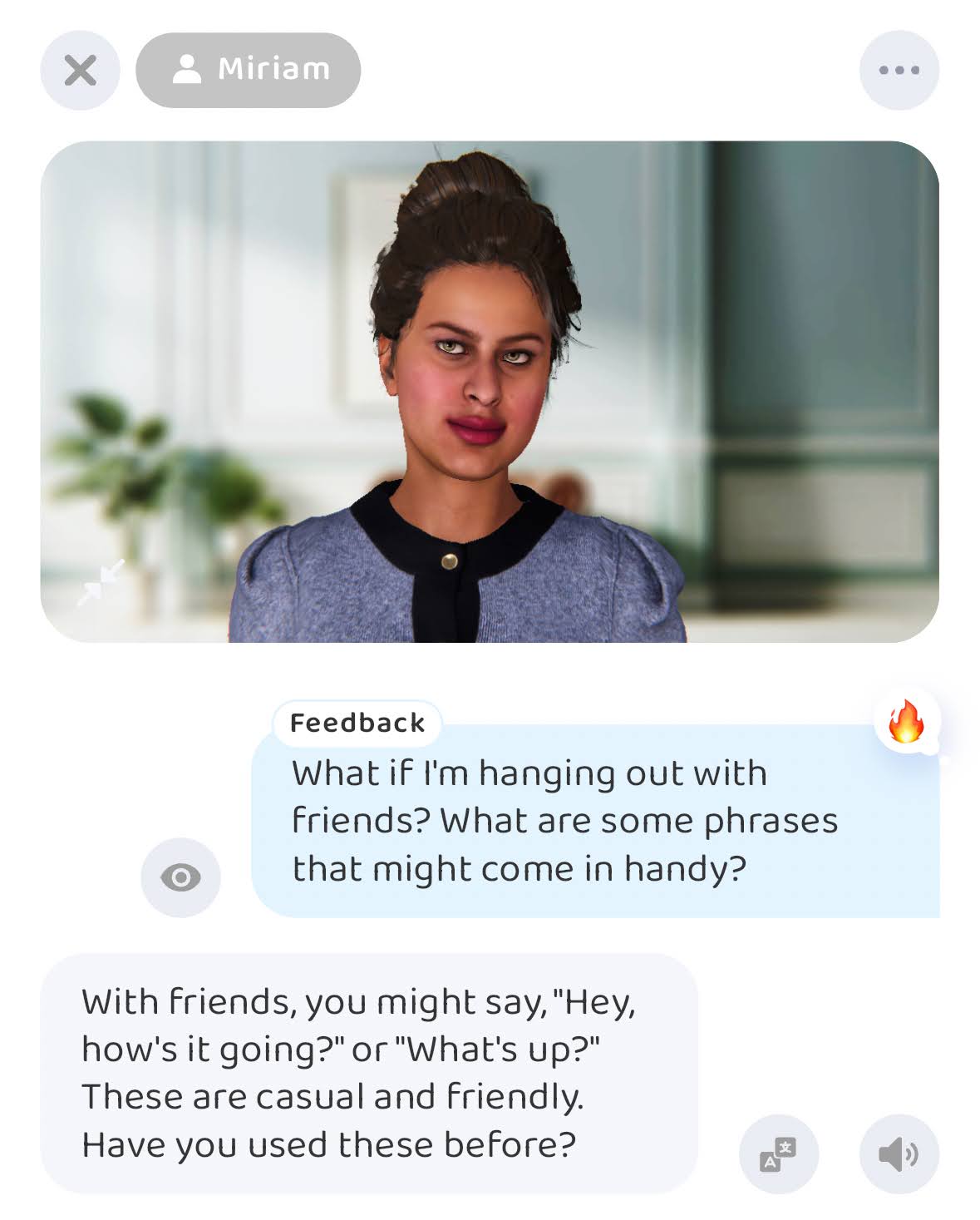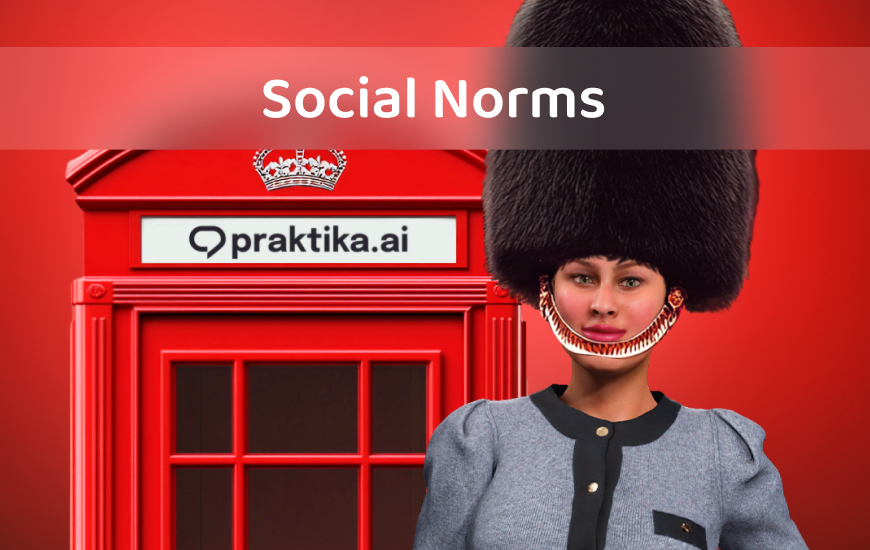Hey there, global citizens! I’m Miriam, and if you’ve ever dreamed of seamlessly blending into a new culture while living or studying abroad, I’ve got some exciting news for you! Moving to a new country can be a wild ride, but knowing how to communicate effectively in English—not just the words, but the cultural context—makes all the difference. Today, we’ll dive into fun, real-life scenarios that teach you the language and the cultural nuances. Ready to start blending in like a pro? Let’s go!
Speak the Lingo and Understand the Culture: Why Etiquette is Key
When you’re moving abroad or studying in an English-speaking country, it’s easy to focus solely on learning the language. But here’s the thing—language is just part of the equation. Understanding cultural etiquette is just as important if you want to fully connect with the people around you. And that’s where Praktika steps in as the best AI tool to help you not only speak English but also understand the social customs that make communication truly meaningful.
Why Etiquette Matters
Different cultures have unique ways of expressing respect, making conversation, and even saying “hello!” Whether you’re in the United States, United Kingdom, Australia, or anywhere else, each country has its own social norms. If you don’t know what’s considered polite or acceptable, it can lead to awkward misunderstandings, and we definitely don’t want that!
Here’s how understanding etiquette can help you blend in:
- Greeting Customs: In some places, a casual “Hey” is perfectly fine, while in others, a formal “Good morning” may be more appropriate.
- Personal Space: In some cultures, getting too close during a conversation might make people uncomfortable, while in others, it’s the norm.
- Table Manners: The way you handle meals can make a huge difference in how you’re perceived. In the UK, for example, they often keep their hands on the table during dinner, while in the U.S., it’s considered polite to keep them in your lap.

Oops, Did I Say That? Laughing at (and Learning from) Cultural Mishaps

Common Cultural Mishaps and How to Avoid Them
We’ve all been there: you say something, and immediately realize it was a bit off. Cultural mishaps are part of the process, and they’re the perfect opportunity to learn and laugh at yourself. While these moments might seem awkward, they can actually be a fun way to discover the cultural differences that make each place unique. Let’s look at a few funny (and totally relatable) examples:
- “How are you?” vs. “How’s it going?”: In some cultures, asking “How are you?” is a deep, meaningful question, while in the U.S. it’s often just a casual greeting. If you respond seriously, it could throw the other person off—leading to an awkward silence.
- Complimenting Someone’s Appearance: In the U.S., saying “You look great today!” is a typical friendly compliment. But in some other cultures, it can come off as insincere or even inappropriate, depending on the context or the level of familiarity.
- Hand Gestures: Something as simple as a thumbs-up can be a positive sign in one country and a rude gesture in another! It’s easy to accidentally make a cultural mistake if you’re not aware of the local nuances.
Praktika Helps You Learn from Mishaps
With Praktika as your AI English learning tool, you can practice these situations before they happen. Here’s how our lessons help you avoid making awkward mistakes:
- Scenario-Based Practice: We simulate common social interactions, from making small talk to navigating compliments and hand gestures. We’ll help you recognize the difference between what’s acceptable in one place and what might be considered inappropriate in another.
- Real-Time Feedback: After every scenario, you’ll get instant feedback on how to improve your delivery and phrasing. This allows you to adjust and get better, without worrying about making the mistake in front of others.
From Stranger to Friend: The Art of Integrating into New Cultures
How Praktika Can Help You Integrate Seamlessly

Praktika understands that social integration is not just about learning vocabulary; it’s about learning how to navigate cultural nuances and build rapport in a new social setting. Integrating into a new culture isn’t just about making friends; it also has significant mental and emotional benefits. Research has shown that social integration can improve overall well-being and reduce feelings of isolation, which is especially important when you’re adjusting to life in a foreign country. Here’s how we can help you make friends and establish connections abroad:
- Interactive Role-Plays: We’ll simulate social settings—like introducing yourself to new people, joining group conversations, or asking about local traditions. This way, you can rehearse and build confidence.
- Cultural Insights: In each lesson, we incorporate cultural tips specific to the country you’re in, from how to make small talk at a party to understanding the local humor. This helps you blend in without feeling awkward or out of place.
This way you’ll not only improve your social life but also enrich your experience abroad.
Introvert? No Worries! Your Personal Practice Space Awaits
Why It’s Great for Introverts
Moving to a new country often comes with the expectation that you’ll constantly engage with others, but let’s be real—not everyone is a natural social butterfly. As an introvert, you might need a little more time to feel comfortable in a new environment. Luckily, Praktika offers the perfect space to work through social situations and build your confidence before you interact with others.
- No Pressure, Just Practice: You can practice conversations, greetings, and social scenarios at your own pace, so you feel comfortable before jumping into the real world.
- Build Confidence in Private: Whether you’re introducing yourself to a classmate or chatting with a colleague, you can rehearse scenarios that you’ll likely encounter, helping you feel more prepared.
- A Safe Space to Learn: With Praktika’s AI tutors, you never have to worry about judgment or making mistakes in front of others. The AI is there to guide you through scenarios, offering feedback and suggestions along the way.

Examples of Social Situations You’ll Practice
Here are some examples of scenarios you can simulate in Praktika:
- Meeting New People: Practice introducing yourself to someone at a social event or a professional gathering. Example prompt: “Let’s role-play how you would introduce yourself at a party—what’s the best way to make a good first impression?”
- Asking for Directions: Perfect for when you’re lost in a new city and need help navigating. Example prompt: “Let’s practice asking for directions politely—what phrases would you use to make sure you’re understood?”
- Ordering at a Restaurant or Café: Whether you’re ordering your morning coffee or a full meal, practicing restaurant etiquette and ordering is key. Example prompt: “Let’s role-play how you would order food at a café and ask for the bill.”
- Making Small Talk at Work: This scenario is perfect for building rapport with colleagues. Example prompt: “Let’s practice how you would make small talk with a coworker during lunch or in the break room.”
- Cultural Etiquette at Social Gatherings: You’ll also practice handling different cultural expectations when attending social events. Example prompt: “How would you compliment a host when attending a dinner party in the U.S.? Let’s practice that!”
By practicing your speaking skills in these situations in advance with Praktika’s AI tutors, you can step into social situations feeling confident and prepared, knowing that you’ve already navigated the conversation in a safe, stress-free space.
Start Blending In Like a Local
By mastering both the language and cultural nuances, you’re ready to take on any social situation abroad with confidence. With the Praktika AI English learning app as your training ground, you’ll feel empowered to navigate social settings like a true local, blending in effortlessly and building real connections. Ready to unlock your social superpowers? Start your journey with Praktika today and become the social butterfly you were meant to be.

From Miriam
Miriam is a passionate linguist and dedicated English tutor, fluent in both English and Hebrew, with a deep love for languages. She has worked with students from diverse backgrounds, helping them master English while embracing cultural nuances. In addition to teaching, Miriam runs a vintage bookstore in Birmingham, where she loves hosting book clubs and sharing her passion for literature.
